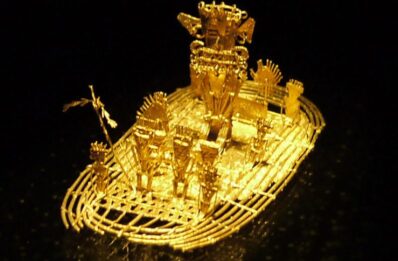 Eldorado is a term derived from El Dorado (Spanish: “The Golden One”). Coined in the 16th Century, El Dorado initially referred to a Columbian tribal ceremony in which new rulers were covered with gold dust and submerged in a lake, and, later, to a mythical South American city of gold that enticed many a European explorer. Eldorado is often called an “anglicized” form of El Dorado, and is used as an adjective rather than a noun—according to Dictionary.com it means “any place offering great wealth.”
Eldorado is a term derived from El Dorado (Spanish: “The Golden One”). Coined in the 16th Century, El Dorado initially referred to a Columbian tribal ceremony in which new rulers were covered with gold dust and submerged in a lake, and, later, to a mythical South American city of gold that enticed many a European explorer. Eldorado is often called an “anglicized” form of El Dorado, and is used as an adjective rather than a noun—according to Dictionary.com it means “any place offering great wealth.”
Such a “place” was the motivating factor of Edgar Allan Poe’s 1849 poem “Eldorado.” Comprised of four six line stanzas, it relates a doomed quest for the City of Gold by a Spanish knight who, as he dies, is advised by a sentient shade to look “Over the mountains/Of the moon/Down the Valley of the Shadow.” Poe scholars have interpreted “Eldorado” as, variously, a trenchant commentary on the then-raging California Gold Rush and a rumination on Poe’s own hopeless quest for fame and fortune (he died virtually penniless, a mere six months after completing the poem).
Such a “place” was the motivating factor of Edgar Allan Poe’s 1849 poem “Eldorado.”
El Dorado, in its original two word form, has inspired a great film (Werner’s Herzog’s 1972 AGUIRRE, THE WRATH OF GOD/Aguirre, der Zorn Gottes) and a so-so one (Carlos Saura’s 1988 EL DORADO). The term “Eldorado,” and the Poe text, have likewise provided inspiration (direct or otherwise) for some classic films, including GREED (1924), THE TREASURE OF THE SIERRA MADRE (1948) and THERE WILL BE BLOOD (2007), as well as several assorted pics titled ELDORADO, not all of them classics.
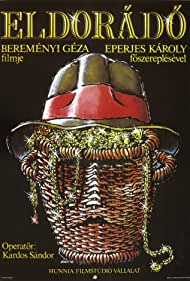 The Hungarian ELDORADO hails from 1988. Written and directed by Géza Bereményi, the film is widely admired in its native land, and proclaimed an accurate portrait of Hungary in the first half of the Twentieth Century. The focus is on a Budapest based black market in the aftermath of WWII; the establishment’s proprietor is Sandor Monori (Károly Eperjes), a sleazy sort who lives what passes for the high life in this gritty environ. He’s forced into a more grounded, morality-centered existence when his young grandson contracts diphtheria and nearly dies. Monori manages to save the boy by offering the resident doctor a gold bar, but that fails to staunch the increasing—and unwanted—interest paid to him and his activities by communist authorities.
The Hungarian ELDORADO hails from 1988. Written and directed by Géza Bereményi, the film is widely admired in its native land, and proclaimed an accurate portrait of Hungary in the first half of the Twentieth Century. The focus is on a Budapest based black market in the aftermath of WWII; the establishment’s proprietor is Sandor Monori (Károly Eperjes), a sleazy sort who lives what passes for the high life in this gritty environ. He’s forced into a more grounded, morality-centered existence when his young grandson contracts diphtheria and nearly dies. Monori manages to save the boy by offering the resident doctor a gold bar, but that fails to staunch the increasing—and unwanted—interest paid to him and his activities by communist authorities.
The use of handheld camerawork and distorted lenses lends this character study a sense of raw immediacy. Even more interesting is the use of color, with the black and white war footage that punctuates the opening scenes giving way to a full (if muted) color palette that in the final scenes goes back to black and white—and not of the documentary sort.
…handheld camerawork and distorted lenses lends this character study a sense of raw immediacy.
El Dorado 1988
Add to that some truly gut-wrenching imagery, such as a horrific glimpse inside a sanitarium whose child patients are covered with sheets and left to die in a vast cluster, and we have an excellent example of reality-based historical cinema. Its thematic connection to Poe’s text should be obvious in the gold bars that are constantly flashed around and, more broadly, in the trajectory of Monori, whose quest for Eldorado is every bit as doom-laden as that of Poe’s knight.
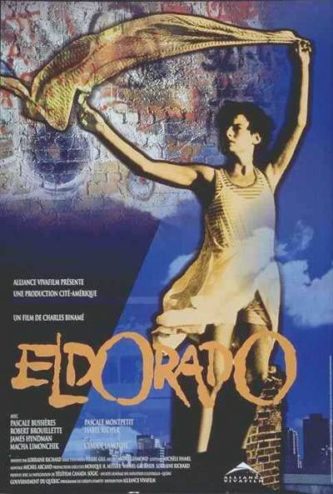 The next ELDORADO hails from Quebec, circa 1995. It’s not entirely germane to this essay (for reasons I’ll get to shortly), but is a first-rate piece of cinema, a heavily improvised ensemble drama that plays like a collaboration between John Cassavetes and Wong Kar Wai. It looks in on six twentysomething losers in Montreal during the summer of ‘94, in particular a sex-obsessed shock jock (James Hyndman) with a bad habit of acting out his compulsions outside the recording studio, and a troublemaking drifter (Pascale Bussières) who turns the life of an overly trusting friend (Isabel Richer) upside-down.
The next ELDORADO hails from Quebec, circa 1995. It’s not entirely germane to this essay (for reasons I’ll get to shortly), but is a first-rate piece of cinema, a heavily improvised ensemble drama that plays like a collaboration between John Cassavetes and Wong Kar Wai. It looks in on six twentysomething losers in Montreal during the summer of ‘94, in particular a sex-obsessed shock jock (James Hyndman) with a bad habit of acting out his compulsions outside the recording studio, and a troublemaking drifter (Pascale Bussières) who turns the life of an overly trusting friend (Isabel Richer) upside-down.
… a first-rate piece of cinema, a heavily improvised ensemble drama that plays like a collaboration between John Cassavetes and Wong Kar Wai.
Director Charles Binamé has created a film that fascinates and annoys in equal measure. Edgy, kaleidoscopic and bearing a relentlessly doom-laden trajectory, ELDORADO is one of the few completely authentic non-documentary portraits of life in mid-nineties Canada (when I was a resident). The actors are all top notch, which shouldn’t be too surprising, as they all receive screenwriting credit.
My one major problem with Binamé’s film, in light of the subject matter of this essay, is that it doesn’t live up to the title. None of the characters are really in search of Eldorado, with their shared objective being, simply, to stay out of their own way. It may be that Binamé began with Eldorado (as defined by Poe’s poem) in mind, but the improvisational nature of the project ensured that the conception never quite made it to the screen.
El Dorado 1995
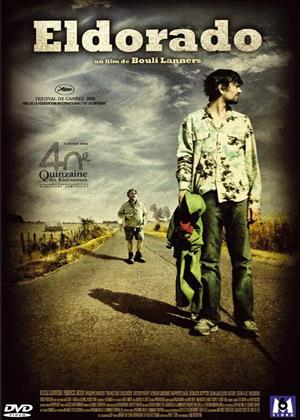 2008’s Belgian-made ELDORADO isn’t much more deferential to its title. It’s about Yvan (Bouli Lanners, also the writer-director), a middle-aged car dealer who catches the recovering heroin addict Didier (Fabrice Adde) breaking into his house. For reasons that don’t become clear until late in the film, Yvan elects to embark on a cross country road trip with Didier, who wants to visit his parents.
2008’s Belgian-made ELDORADO isn’t much more deferential to its title. It’s about Yvan (Bouli Lanners, also the writer-director), a middle-aged car dealer who catches the recovering heroin addict Didier (Fabrice Adde) breaking into his house. For reasons that don’t become clear until late in the film, Yvan elects to embark on a cross country road trip with Didier, who wants to visit his parents.
A dark-hued but essentially sweet and optimistic comedy (a combination that tends to wow festival-goers), I found the film dull and uninvolving, with Lanners over-relying on pretty scenery to move things along, and wrapping things up with a wholly misconceived “joke” involving the killing of a dog. Also, the title makes little sense outside a sarcastic jab at the protagonists’ journey (with Didier’s parents’ house being a far cry from anyone’s idea of Eldorado).
A dark-hued but essentially sweet and optimistic comedy (a combination that tends to wow festival-goers), I found the film dull and uninvolving…
El Dorado 2008
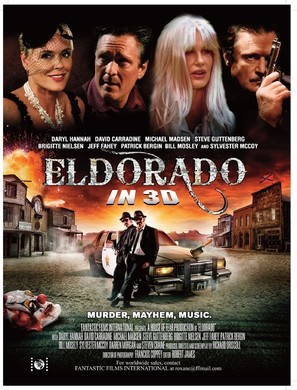 No such issue exists with 2012’s ELDORADO, a digitally shot, British made monstrosity from 2012 which honors Poe’s text quite blatantly—and about which “worst movie ever made” is a common summation.
No such issue exists with 2012’s ELDORADO, a digitally shot, British made monstrosity from 2012 which honors Poe’s text quite blatantly—and about which “worst movie ever made” is a common summation.
The pic’s major non-Poe related objective was to goof on THE BLUES BROTHERS (a movie I thought was already a goof). To that end it features the English accented Oliver and Stanley, a.k.a. “The Jews Brothers,” two very Jake and Elwood-esque black-suited brothers driving through what is supposed to be America in a stolen police car. They go up against neo-Nazis, a machine gun packing ex-wife and overzealous cops, with a handful of songs from THE BLUES BROTHERS soundtrack (including “Think,” “Stand by Your Man” and “Everybody Needs Somebody to Love”) performed, quite poorly, by the cast members.
Speaking of cast members, the amount of slumming former movie stars appearing in this film has to set some kind of record. There’s Daryl Hannah, David Carradine (in footage filched from the 2008 Spike TV film KUNG FU KILLER), Jeff Fahey, Patrick Bergin, Brigitte Nielsen, Steve Guttenberg, Michael Madsen (looking very drunk), Caroline Munro and Peter O’Toole, who periodically pops up in the upper right hand corner of the screen to deliver monotone narration.
Speaking of cast members, the amount of slumming former movie stars appearing in this film has to set some kind of record.
El Dorado 2012
Getting back to the Edgar Allan Poe angle, Hannah is seen posed in numerous desert settings, reciting the Poe poems “Imitation,” “Romance” and, eventually, the text that gives this film its title. There’s also a desert diner that serves human flesh, a rehash of the bean eating scene from BLAZING SADDLES, and recreations of the highway montages from EASY RIDER and the torture sequence from RESERVOIR DOGS, as well as a brief appearance by the very Johnny Depp-esque “Captain Jake.”
None of this works as parody (it’s never very funny) or a ROCKY HORROR-esque cult movie opus (as it’s not weird or flamboyant enough). It doesn’t even work on the most basic level, with thoroughly incompetent storytelling moved forward by the O’Toole narration (the fact that his recitations are self-aware and admit to the narrative failings doesn’t forgive the incompetence) and frequent dissolves from one episode to the next, regardless of whether said episode has properly concluded or not.
In summation, the 1988 and ‘95 ELDORADOS are classics, while the second two are most decidedly not. Moral: you’d be wise to view the first two only, or, better yet, skip them all in favor of AGUIRRE: THE WRATH OF GOD.
